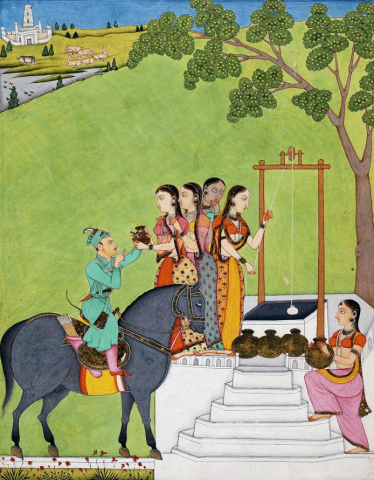
"Water" was the theme for our last two-year cycle, 2015-2017. Water covers some seventy percent of the earth’s surface and is vital to all life forms. Water is metaphorically evoked in rituals, like rites-of-passage, baptism, and ablutions. It signifies shifts in thinking, like “sea changes” and “ebbs and flows.” Water’s extremes, such as flooding and drought, shape the human experience through their practical consequences and their symbolic implications. Seascapes and waterscapes inspire art, music and literature. Trans-oceanic voyages often provide the prologues for terrestrial histories of exploration and trade, as well as conquest, colonization, and imperialism. Pools, beaches, and riverbanks were the playgrounds of our youth, providing spaces for absorbing societal values, developing social and conversational abilities, crafting a sense of group cohesion, and enhancing real-world abilities, like leadership, responsibility, and loyalty. For the Greeks, it constituted, along with earth, air, and fire, one of the foundational elements of life. The flood stories that are features of so many cultural traditions attest to its role in inundating human accomplishments as well as providing a basis for society. Yet, water largely remains peripheral to scholarly lines of inquiry that focus on land. By focusing our attention on “Water” for the period 2015-17, we will explore the contribution of humanities scholarship to an understanding of water’s role in society. What conceptual frameworks are helpful to understand the role of water? How does the study of the social, cultural, symbolic and historical role of water help us think about the fraught issues of water in the contemporary San Joaquin Valley, California, and the world? The theme engages issues of culture, food, work, maritime history, political relations, agriculture, architecture, urban planning, transportation, hygiene, medicine and public health, immigration, energy, technology, environment, marine sciences, literature, visual and performing arts, spirituality, and other intellectual lines of investigation into water usage, applications, and representations.
Potential subjects of inquiry include (but are not limited to):
· Water as a site for work and play
· Disasters wet and dry
· Water as myth and metaphor
· The look and sound of water
· Water travel and transport
· The history and politics of irrigation
· Water access and social power
· Water as an element of spatial design, e.g. gardens and landscapes
· Ecocriticism and concepts of flow
In addition to the humanistic inquiry that is the focus of the seminar, we partnered with on- and off-campus groups (including CITRIS and the Merced Multicultural Arts Center) to develop a robust interdisciplinary series of events.
"The World Upside Down: Topsy-Turvy" was the theme for our first two-year cycle, 2013-2015. Learn more about the theme here.



